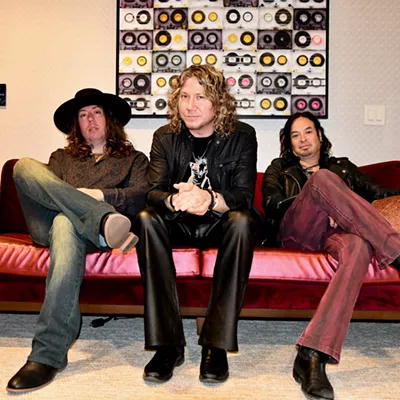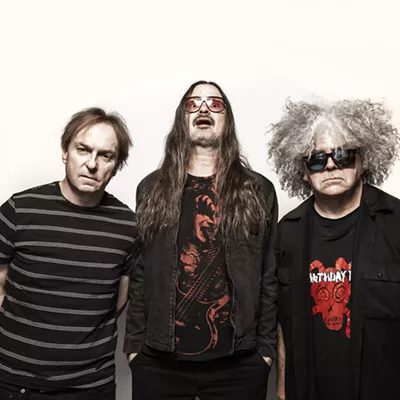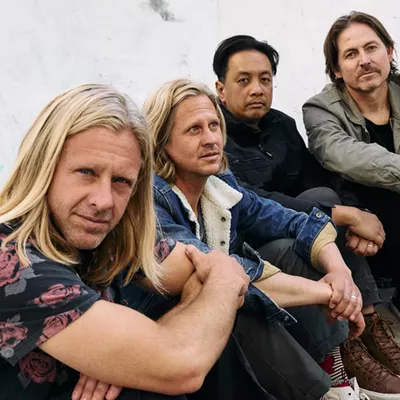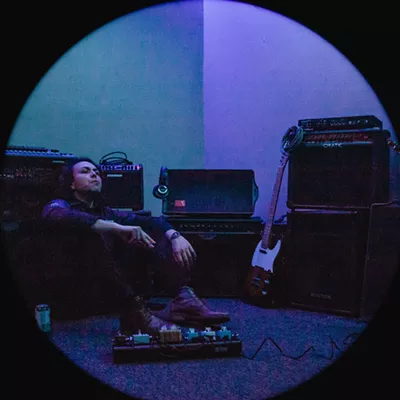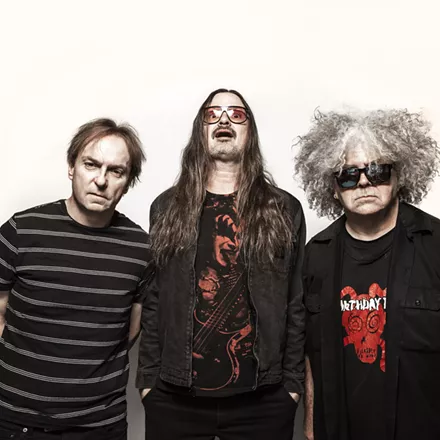On the road and heading toward Tucson for a gig Tuesday night, Sept. 20, at Solar Culture Gallery, Barbez is a band in which everything is permitted and nothing is forbidden, at least musically.
When the band formed about eight years ago as an accordion-and-guitar duo, the gregarious guitarist Dan Kaufman, a refugee from Madison, Wis., was burned out on playing by-the-numbers rock and pop music. "I mean by just having the rock instrumentation--I felt that I heard it all before.
"I think that bringing in these other instruments helps to free things up a bit," Kaufman said last month by phone from his home in Brooklyn. "What's interesting is the spirit and energy contained in these instruments and the cultural traditions of them, not actually the sound, per se."
Barbez's latest CD is Insignificance, which was just released on Important Records.
In addition to guitars and percussion, instruments played by the members of Barbez include violin, marimba, melodica, programmed Palm Pilot and anything else they can coax sound from, including the legendary theremin.
Invented in 1919 by Léon Theremin, this crude precursor of the synthesizer resembles a handsome piece of furniture--maybe a credenza or an upright dresser--from which extend two radio antennae that generate an electric field. By moving his or her hands, the player interrupts the field to create pitched electronic music.
Although the theremin has as much range as a violin, most listeners will recognize it as the sound of a flying saucer landing in 1950s sci-fi movies.
And in Pamelia Kurstin, Barbez boasts one of the world's great theremin players, said Kaufman.
"There are probably like half a dozen people in the world who can play it well. Maybe that's an exaggeration, but it's a really weird instrument that has not developed a massive following," Kaufman added.
Like Kaufman, Kurstin is working on a solo album for John Zorn's adventurous Tzadik Records.
Another integral part of Barbez is Russian-born singer-dancer Ksenia Vidyaykina.
"Ksenia is really incredible," Kaufman said. "All those Russian songs are already a part of her. Especially in the Far East and Europe, that culture is still there. But like the traditional folk cultures, there was also the Russian rock scene, so she's familiar with that as well. It's not like people live in a bubble or anything."
Kaufman said that even in American popular music, interest is growing in more "ancient" music. "So it's cool to do the old Russian folk tunes, and we really attack them. We like to do those songs because they are so breathtaking and gut-wrenching."
Barbez has recorded each of its albums at the Brooklyn-based BC Studio, which is owned and operated by avant-garde engineer Martin Bisi. His wide-ranging resume includes such monumental albums as Herbie Hancock's Future Shock, Sonic Youth's Evol and Torture Garden by Zorn's band Naked City.
Bisi, said Kaufman, "is such a special engineer, always creative and helping us get the sound we hear. He uses this amazing room-mic set-up to get that killing drum sound."
To some degree, Barbez has been embraced by the so-called downtown avant-garde music scene in New York, Kaufman said. "It's nice, because we feel a part of it but not like so part of it. We're not really that particularly jazz or improv."
The simple act of categorization might constrict Barbez's music.
"One of the strengths of the band is the open-mindedness we all share. That's an important thing that has a higher value in and of itself. There's no borders. There's no preconceived ideas, or any kind of value judgment at play. I mean, aren't all kinds of borders, even those between countries, kind of arbitrary?"
Speaking of geography, Kaufman reported that it's not usually difficult to find an audience for Barbez's cosmopolitan music, even in the most out-of-the-way spots.
"Sometimes, we think we are really esoteric. But we're always surprised at how many people really respond to the band's sound. Some of our best shows have happened in some of the smaller places, such as small Southern towns. There's always going to be a passionate subset of music listeners in every place that is interested in unusual sounds.
"There might only be a show of unique music every so often, so it's almost more special for them. If you only get ice cream once a week, then you really look forward to that ice cream during the rest of the week."

